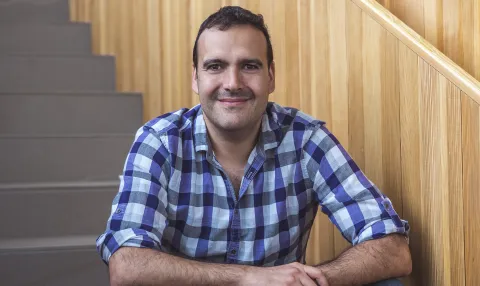“I feel my work can have a much larger impact on health care, by providing knowledge or solutions that are available to everyone.”

Felipe Eltit
- Degree:
- Doctor of Philosophy
- Grad year: 2019
- Program:
- Campus: Vancouver
I started my PhD journey after several years of dental clinical practice and teaching at the university level. In my practice, the major clinical problems that I faced involved the interaction of the human body with biomaterials. My clinical background, combined with my master’s in cell biology, drove my interest in learning about materials and how they may affect human tissues. I joined the materials engineering department with my degree in biomedical engineering, in order to develop a multi-disciplinary and multi-institutional project regarding the mechanisms of failure of metal hip implants. For this project, I explored the mechanisms of corrosion of metals in the human body and the effects of this process in cells, analyzed at the clinical, histological, immunological and molecular levels, and made important contributions to our knowledge of body and implant interactions.
I am highly motivated in contributing to community and societal development. As an example, I developed an interchange program between the faculties of dentistry at UBC and Finis Terrae University, in Chile. As a result, 16 students visited UBC, a world class university, and 10 UBC students visited Chile, working in low-income communities providing dental attention. As president of the Biomedical Engineering Graduate Student Association and the BC chapter of the Canadian Biomaterials Society, I also developed seminars and talks to provide for both undergraduate and graduate students opportunities to interact with researchers, companies and entrepreneurs.
Outside of academia, for the past six years I have hosted the radio show ”Ecos de mi Pueblo” at Vancouver Cooperative radio (100.5 FM), providing information and education to the Latin American community of Vancouver. The show also focuses on supporting recent immigrants and temporary foreign workers by educating them on their rights while in Canada.
Why did you choose engineering?
During my years of clinical practice as a dentist, I realized that I could make an important difference in my patients’ quality of life. This starts with personal communication, effective treatment and then follow-up; however, I was limited to the number of patients that I could physically visit in a day. In contrast, although in engineering I do not see patients and do not get that feedback or gratitude directly, I feel my work can have a much larger impact on health care, by providing knowledge or solutions that are available to everyone. That was my motivation to pursue my PhD degree in biomedical engineering at UBC, as well as to work on improving the health-related problem for patients with implant failure.
What has made your time at UBC the most memorable?
I lived most of my life in a very homogeneous country, where mostly everyone speaks the same language, has the same religion and eats the same food. At UBC I met a plethora of backgrounds in my colleagues, professors and friends that made me understand the world in a better way.
What have you learned in engineering that is most valuable?
Engineering has a different approach to the problems than I observed as a clinician: Is there a market? Is there a product to patent? Is this the cheapest way to do this? These are questions that we don’t ask in clinical practice. In biological sciences we talk about questions and hypotheses, in engineering these words are more often problem and objectives. Being in an engineering department I learned concepts beyond basic science research: preclinical testing, stakeholders, investors, industrial partners and regulations. I think this combination of views will be critical in my future work.
What has been your most memorable/valuable non-academic experience studying engineering at UBC?
The most important message that I learned at UBC is the respect and recognition of Indigenous peoples. To see the president of the university doing a territorial acknowledgment at the beginning of a ceremony is an inspiration for the new generations. I know it means recognizing a shameful history, but the steps towards recognition and reparation are an example that I would love to see replicated in Latin America, where our natives are still ignored, and genocides that were carried out in the twentieth century are still denied by our governments.
What advice would you give a student considering a graduate degree in engineering?
Two basic pieces of advice: the first one is that you have to like the process of being in grad school. It is not just a goal to accomplish but could be a long process that takes many years; a degree by itself is not worth doing if it is something that you will not like. It is also about life, what you do, and the city where you live. Those aspects need to be taken in consideration. Personally, I came to Vancouver before applying, and I did it in winter to verify if I could live here and deal with the weather —I loved it!
The second is to meet your supervisor in advance; you will have a working relationship for two to three years in a master’s or five to six years in a PhD. As with every relationship, it depends on both people and sometimes it may not work. I was lucky to meet my supervisor and committee members, with whom I have developed a great relationship, and this is key to succeeding in grad school.
Where do you find your inspiration?
In the generation of knowledge, I have always been inspired by the classic scientist and philosophers that developed the knowledge based on questions and observations of simple phenomena, changing paradigms. Many of them were rejected by their societies, prosecuted or harassed, but made the most significant progress on human knowledge. Eratosthenes, by just observing shadows and counting steps, could determine precisely the diameter of the earth when everyone said it was flat. Twenty centuries later, Galileo could defy the dogmas by simply dropping rocks from a tower. By the observation of the sky he proposed that it was the earth that moves and not the sun and he risked his own life for doing so. Johannes Kepler generated a mathematical model to explain the universe, generating the laws that rules the movement of stars and planets, he was misunderstood. Still today obtaining knowledge and communicating it is dangerous and is banned in many countries, but knowledge is what allows humans to progress.
With regards to communication of knowledge, my role models are Carl Sagan or Hernan Olguin. They made science available to everyone and inspired thousands of children to pursue a scientific career. Cosmos was an amazing book and TV show that explained science in the simplest language that a 10-year-old kid — as I was at the time — could understand. If I am a scientist now, it is partly thanks to these amazing communicators and scientists. The role of Carl Sagan making science available to everyone gave me the inspiration to communicate science, as I do in my radio show, and educate people by using available media.
How will you go on to make a difference in our world?
By educating and communicating, it is the best tool I have.



